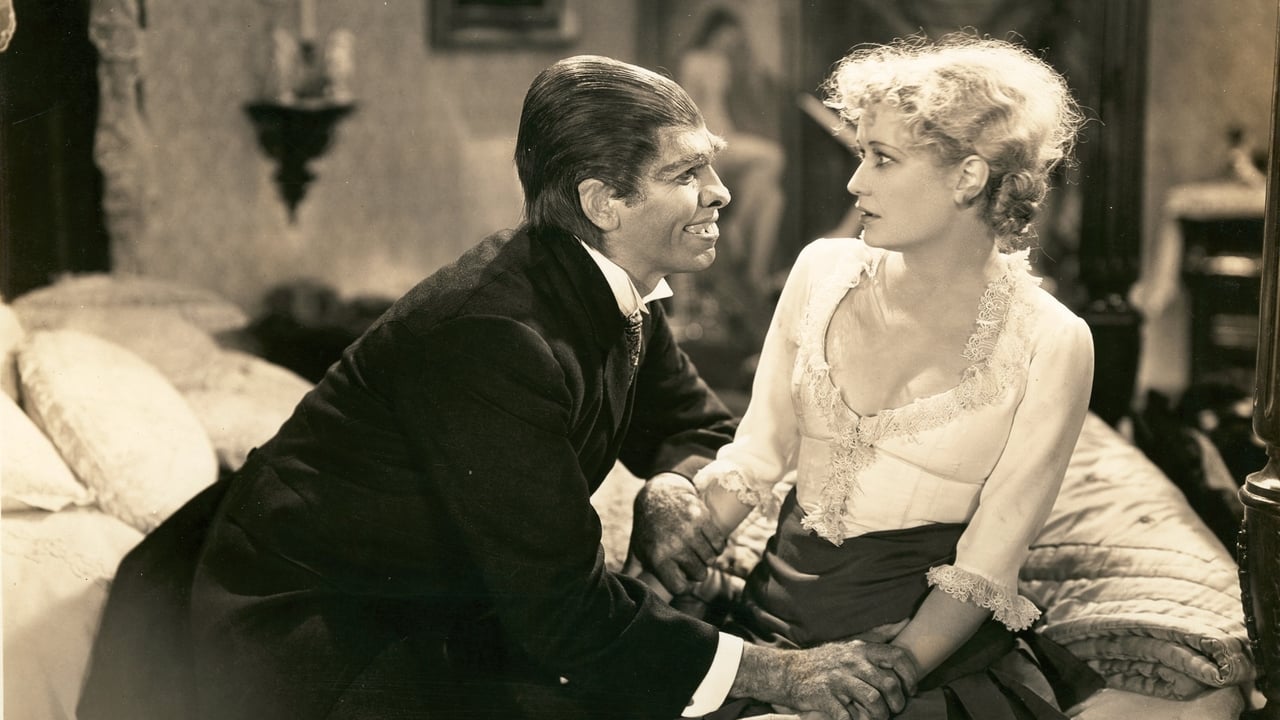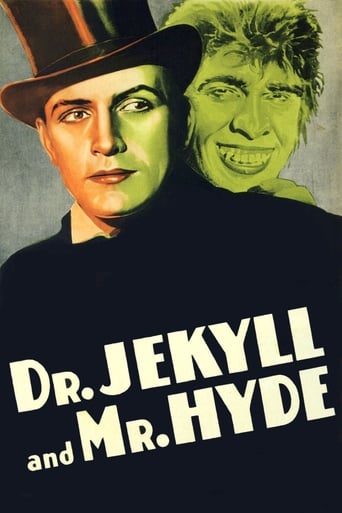Nonureva
Really Surprised!
WillSushyMedia
This movie was so-so. It had it's moments, but wasn't the greatest.
StyleSk8r
At first rather annoying in its heavy emphasis on reenactments, this movie ultimately proves fascinating, simply because the complicated, highly dramatic tale it tells still almost defies belief.
Darin
One of the film's great tricks is that, for a time, you think it will go down a rabbit hole of unrealistic glorification.
JLRVancouver
The only 'horror' film to take home a 'Best Actor' Oscar (for Fredric March's titular duel role), "Dr. Jekyll and Mr. Hyde" is one of the classic horror films to come out of the 1930's (a banner decade for the genre). March is outstanding as the sneering, hyperkinetic Hyde, managing to 'act around' the huge prosthetic semi-simian teeth he sports as the dark side of good Dr. Jekyll (who is, of course, a substantially less interesting (or entertaining) character). The movie is pre-code, so the sexual side of Jekyll's inner demon is not downplayed and Hyde's abuse of dance-hall girl Ivy Pearson (Miriam Hopkins) is quite rough. The famous transformation scenes still look great (admittedly they can't compare with modern prosthetics or CGI) and the moody, symbolic cinematography is excellent. Overall, the movie is one of the great classic horror films and is not to be missed by fans of the genre or anyone looking for a good movie to watch at midnight.
BA_Harrison
Paramount gives Universal a run for their money with this excellent adaptation of Robert Louis Stevenson's novel Strange Case of Dr Jekyll and Mr Hyde.Fredric March stars as well-meaning Dr. Henry Jekyll, who is convinced that a person's soul consists of two halves, the good self and the bad self, and that mankind would benefit if he could banish the bad and liberate the good. In his laboratory, Jekyll perfects a potion that will separate the two sides of his personality and uses himself as a guinea pig. The formula allows Jekyll's repressed bad self to take control and, as his new alter ego Mr. Hyde, the doctor enjoys the forbidden fruits of old London town.If only Dr. Jekyll wasn't so sexually frustrated, things might have turned out differently. Engaged to be married to the lovely Muriel Carew (Rose Hobart), but made to wait for months on end by his future father-in-law Brig. Gen. Danvers Carew (Halliwell Hobbes), Jekyll has a serious case of blue balls; it is this that causes Hyde to come to the fore. As his monstrous bad self, free of all morality and decency, he is able to indulge in every animalistic whim, taking a mistress, variety hall girl Ivy Pearson (Miriam Hopkins), and treating her like a sex slave.Of course, none of this is any good for Jekyll's relationship with Muriel, especially with Hyde eventually being able to take control without the need for the potion.Not only does Dr. Jekyll and Mr. Hyde boast an Oscar winning performance from Fredric March, it also benefits immensely from outstanding direction from Rouben Mamoulian, whose innovative film-making approach makes the film a marvel to behold. Opening with a wonderful extended POV shot as Jekyll plays the organ and prepares to give a lecture, Mamoulian executes a variety of ground-breaking techniques (the mirror trick is still impressive, even to this day) and makes effective use of his atmospheric foggy London sets. Made in Pre-Code Hollywood, the film also packs in quite a bit of racy material, Ivy stripping to get ready for bed (Hopkins giving a brief flash of side-boob) and Hyde promising the poor, terrified girl a night to remember.An excessively mawkish scene in which Jekyll eventually confronts Muriel, telling her that he must set her free, probably would have aged better if the melodrama had been toned down a bit, but other than that the film is simply terrific—up there with Frankenstein and The Invisible Man as one of the greatest classics of the era, and of the genre as a whole.8.5 out of 10, rounded up to 9 for IMDb.
Antonius Block
This take on the classic Robert Louis Stevenson story is classic in its own right, and works on many levels. There's the obvious psychological component to the story, with Jekyll representing the ego/superego, and Hyde the id. We also have the theme of the scientist tampering with nature with an altruistic goal, in this case to rid the psyche of the bad side, become 'super-good', and achieve more, but with a disastrous result that quickly gets out of his hands. But perhaps most importantly, we have the sheer horror of a man unchecked by morality, who is 'free' from constraint, and who promptly rapes, brutalizes, and murders before running off into the foggy London night. He's not an unthinking animal, however – he has all of his cognitive abilities, speaks, and uses logic to elude capture – and this, combined with film sequences that are shot from Jekyll/Hyde's perspective, amplify the fact that this villain is within us all, which is the greatest horror of all.As an aside: isn't it interesting that while Dr. Jekyll clearly contains the two sides of man, the good and the evil, the female characters in the film seem to be neatly one-dimensional: Muriel (his fiancée, 'good'), and Ivy (the dancehall girl, 'bad'). And that after he's taken the potion, he gets darker in addition to becoming uglier and needing some serious orthodontia? But I digress. Frederic March is fantastic as Jekyll and Hyde, and won an Oscar for his performance. He plays the lecher without mercy, and leaps around during some exciting chase sequences. The scene where he shows up in Ivy's mirror after she's been assured by Dr. Jekyll that he's gone for good is frightening. Dr. Jekyll thought he could make that promise before he realized that not taking the potion was no longer sufficient to stop the transformation to Mr. Hyde, and that mere impure thought could now bring it about. It's hard to put the lid back on once Pandora's Box has been opened.Miriam Hopkins shows nice range as Ivy, first absolutely sizzling in a scene where she tries to seduce Dr. Jekyll, a scene ending with her swinging her bare leg from a bed, giving him a serious ravage-me look, responding to his saying he can't return playfully with "oh yes you can", and imploring him to "Come back soon, won't you?....Soon...Come back." Yowza. Later, she's suitably horrified by Mr. Hyde, who does have his way with her, and abuses her without mercy. (she only shows the whip marks to Jekyll, we neither see this happening or the marks themselves … but it's enough to make us shiver) That dangling leg is left superimposed on the screen for some time while Dr. Jekyll walks off with a colleague, exclaiming ""Can a man dying of thirst forget water? Do you know what would happen to that thirst if it were denied water?" His marriage to Muriel has been delayed at her father's request; the suggestion is he's sexually frustrated, and after taking the potion, he makes a beeline back to see Ivy.Aside from special effects that are outstanding for the time period, and which hold up well today (particularly the first transformation), the film adds some other nice touches. Dr. Jekyll's organ playing is brief but adds a manic and morbid tone, as the film cuts to a candelabra, a statue, a bust, and a tight shot of his servant's face in succession. At one point, Dr. Jekyll is in the park, hears birdsong, and quotes Keats' 'Ode to a Nightingale' ("thou wast not born for death, immortal Bird! No hungry generations tread thee down…") … before seeing a cat advancing along the branch to silence that song. Later, as Hyde strangles Ivy, they slump behind a bed, revealing in the background a replica of Canova's 'Psyche Revived by Cupid's Kiss' which director Rouben Mamoulian leaves us with until Hyde gets back up.The movie has some pretty dark content, but it's asking questions about man's nature, and this version is balanced and moves along well. Definitely a classic.
sol-
Based on Robert Louis Stevenson's iconic story, this horror film focuses on a scientist who develops a way to transform into a Neanderthal-like man with animalistic impulses. It is an interesting concept with lots of dialogue about evil existing inside everyone and repressing one's base desires, but the real standout element here is the filmic style. The film features innovative point-of-view camera- work that frequently tracks and pans. Then there is a superb lethargic dissolve of a woman's leg to show how ingrained the image is our hero's mind. Plus there is a great bit in which reaction shots between two lovers gradually zoom in closer... and the list goes on. The film is so technically advanced that it is still impressive by standards today; only the over-the-top makeup effects (complete with buck teeth) disappoint. With so much attention dedicated to the look of the film, it is perhaps unexpected that the story sags a little. Absolute no romantic sparks exist between Fredric March and Rose Hobart, which makes his pining to marry her a little hard to buy, and a subplot with a wanton Miriam Hopkins (not part of the original story) only works slightly better. When the film concentrates on March though and his increased difficulty of keeping Hyde under wraps, it rarely missteps. As alluded to, the film has a lot to say about dualities with the nature of humankind and the visuals are absolutely top notch.

